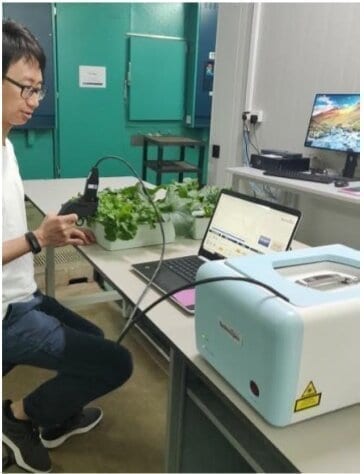
Stagnating crop yields pose a threat to soil
The yields of many important crops in Europe have been stagnating since the 1990s. As a result, the input of organic matter into the soil – the crucial source for humus formation – is decreasing. Scientists from the Technical University Munich (TUM) suspect that the humus stocks of arable soils are declining due to the influence of climate change. Humus, however, is a key factor for soil functionality, which is why this development poses a threat to agricultural production – and, moreover, in a worldwide context.
In their study, which has been published in Science of the Total Environment (2015), scientists from the Technical University Munich (TUM) evaluated the crop yield statistics for EU countries compiled by the Food and Agriculture Organization of the United Nations (FAO) since the 1960s. The yields for the three most important cereal crops, wheat, barley, and corn, have been stagnating in Central and Northern Europe for 20 years. “The stagnation in yields has only been statistically verifiable for a few years,” explains Dr. Martin Wiesmeier from the TUM Chair of Soil Science in Freising-Weihenstephan and first author of the study. This finding coincides with those of other studies, which confirm that crop yields, particularly in the case of cereals, are falling throughout the world.
“Due to the strong link between crop yields and the input of organic substances into the soil, the stagnation in yields must also have an impact on the humus stocks in the soil,” says TUM scientist Wiesmeier, “particularly in the context of the steady rise in temperatures.” Given that rising temperatures cause higher levels of humus decomposition while, at the same time, the supply of organic substances is stagnating, a depletion of humus must be expected in the long term.
Climate change and changes in EU agricultural policy as possible causes?
The cause of the yield stagnation has not yet been explained but is probably due to a variety of factors: “Following the introduction of new priorities with the joint EU agricultural policy of the 1990s, among other things, less fertilizer was used and leguminous plants were often omitted from crop rotation cycles,” explains Wiesmeier’s co-author Dr. Rico Hübner from the Chair for Strategic Landscape Planning and Management, also in Weihenstephan. “Few authors have discussed this as a reason for the stagnation in crop yields,” he notes.
However, the changes in climatic conditions arising from climate change could represent a far more important factor here: i.e. temperatures that increasingly exceed the optimum level for plant growth, like those experienced this summer, shifts in the vegetation periods, and more frequent droughts. “This inevitably leads to stagnation in crop biomass production and reduced inputs of organic matter into the soil,” says Wiesmeier.
Moreover, livestock numbers in Europe have also declined significantly since the 1980s. “The spreading of organic fertilizer, another important source of organic matter, is also falling as a result,” adds Wiesmeier.
Early signs of a reduction in humus stocks due to the stagnating harvest yields can already be observed. Initial indications of humus depletion in arable soil have been observed in almost all EU countries in recent years.
Interdisciplinary research group
While many previous studies predicted a future increase in humus levels as a result of climate change, based on their current findings, the TUM scientists are critical of this assumption: If the input of organic matter stagnates, soil will lose some of its humus in the long term. “If this trend continues, it could have negative impacts on soil fertility and water storage capacity,” concludes TUM scientist Wiesmeier. “This, in turn, could ultimately result in poorer harvests – a vicious circle,” he adds.
Read more: Humus depletion induced by climate change?
The Latest on: Humus depletion
[google_news title=”” keyword=”Humus depletion” num_posts=”10″ blurb_length=”0″ show_thumb=”left”]
via Google News
The Latest on: Humus depletion
- Ozone Holes Newson April 23, 2024 at 5:00 pm
Apr. 23, 2024 — Powerful monsoon winds, strengthened by a warming climate, are lofting unexpectedly large quantities of ozone-depleting substances high into the atmosphere over East Asia ...
- Catalase Market Expansion: A Close Look at the US$ 516.6 Million Forecast by 2032 | Future Market Insights Inc.on April 22, 2024 at 3:48 am
The Catalase market is witnessing substantial growth due to its pivotal role in various industries. As an essential enzyme, Catalase plays a crucial role in catalyzing the decomposition of hydrogen ...
- Gov’t’s depletion policy has often been stated as ‘produce as much oil as possible before Zero Net becomes a reality’on March 27, 2024 at 5:01 pm
The OGGN response focused on two issues, access to information on Guyana’s depletion policy and legibility of Laws (unlike their UN-HRC submission which ventured into every possible area ...
- Scientists discover methods to regulate carbon storage in humus layer of forest in north Chinaon March 25, 2024 at 10:25 am
However, the regulating factors of humus carbon sequestration in the boreal forests globally are not entirely understood. Dr. Sun Tao and his team from the Institute of Applied Ecology of the ...
- What on Earth Is Humus—and Why Should Homeowners Care?on March 19, 2024 at 10:58 am
Q: My neighbor recently told me that the secret to his lush lawn and thriving vegetable garden is humus. What is humus, what’s it made of, and where can I get it? Decomposition can be ...
- Should investors worry about the Permian Basin’s depletion now?on February 12, 2024 at 9:17 am
Diamondback Energy’s (NASDAQ:FANG) deal to buy privately held Endeavor Energy Partners highlights an M&A rush that has taken place lately in the Permian Basin, a key production area in Texas.
- Soil Carbon Storageon January 11, 2024 at 6:56 am
Humus is highly recalcitrant ... the conversion of natural ecosystems to agricultural use has resulted in the depletion of SOC levels, releasing 50 to 100 GT of carbon from soil into the ...
- How a Solar Cell Workson August 13, 2022 at 3:42 pm
This creates an area around the junction, called the depletion zone, in which the electrons fill the holes (Fig. 1, closeup). When all the holes are filled with electrons in the depletion zone, the ...
- Soil Carbon Storageon January 5, 2022 at 2:05 am
Humus is highly recalcitrant ... the conversion of natural ecosystems to agricultural use has resulted in the depletion of SOC levels, releasing 50 to 100 GT of carbon from soil into the ...
- How to Make Humuson March 10, 2021 at 5:01 pm
I am writing down this recipe because Verna has been bragging about my humus to her friend Teri. My humus is different every time I make it, but Verna must have tasted one of the good batches. Then ...
via Bing News




